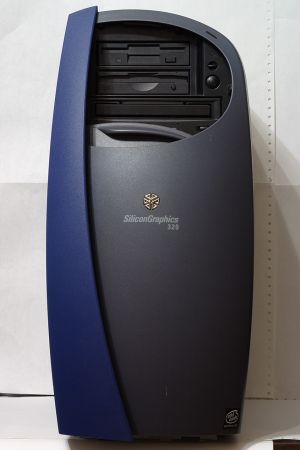Visual Workstation 320: Difference between revisions
From TechPubs Wiki
Created page with "The '''SGI Visual Workstation 320''' is an x86 workstation manufactured by SGI and designed to run Windows NT and GNU/Linux. The Visual Workstations are notable for their use of the Intel Pentium II and Intel Pentium III processors (rather than the 64-bit MIPS RISC architecture usually used in SGI computer products), but are fundamentally ARCS firmware systems regardless of their ISA used. == Hardware == The 320 is capable of taking 2 Slot-1 Pentium II or III CPUs with..." |
No edit summary |
||
| Line 1: | Line 1: | ||
[[File:VW 320 Chassis.jpg|thumb|A VW 320 chassis with the sliding door open]] | |||
The '''SGI Visual Workstation 320''' is an x86 workstation manufactured by SGI and designed to run Windows NT and GNU/Linux. The Visual Workstations are notable for their use of the Intel Pentium II and Intel Pentium III processors (rather than the 64-bit MIPS RISC architecture usually used in SGI computer products), but are fundamentally ARCS firmware systems regardless of their ISA used. | The '''SGI Visual Workstation 320''' is an x86 workstation manufactured by SGI and designed to run Windows NT and GNU/Linux. The Visual Workstations are notable for their use of the Intel Pentium II and Intel Pentium III processors (rather than the 64-bit MIPS RISC architecture usually used in SGI computer products), but are fundamentally ARCS firmware systems regardless of their ISA used. | ||
Revision as of 19:36, 1 March 2025

The SGI Visual Workstation 320 is an x86 workstation manufactured by SGI and designed to run Windows NT and GNU/Linux. The Visual Workstations are notable for their use of the Intel Pentium II and Intel Pentium III processors (rather than the 64-bit MIPS RISC architecture usually used in SGI computer products), but are fundamentally ARCS firmware systems regardless of their ISA used.
Hardware
The 320 is capable of taking 2 Slot-1 Pentium II or III CPUs with up to 1GB of system memory, shared between the GPU and CPU. Otherwise, it can take 3 3.3V PCI expansion cards. Architecturally, the COBALT graphics processor is related to the MIPS-powered O2 system.
Operating System Support
It was designed to run Windows NT 4.0 and 2000 as well as several GNU/Linux distributions.